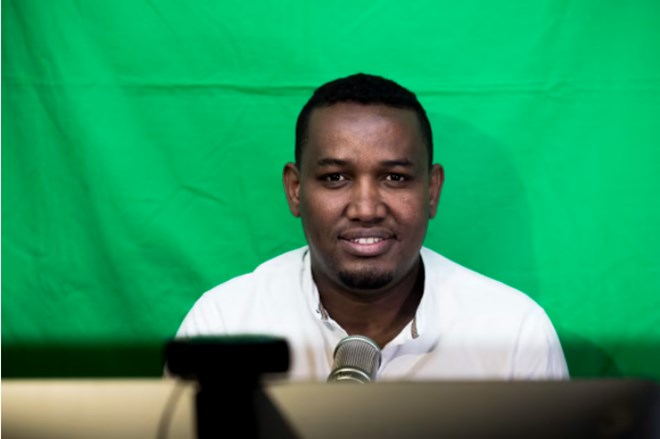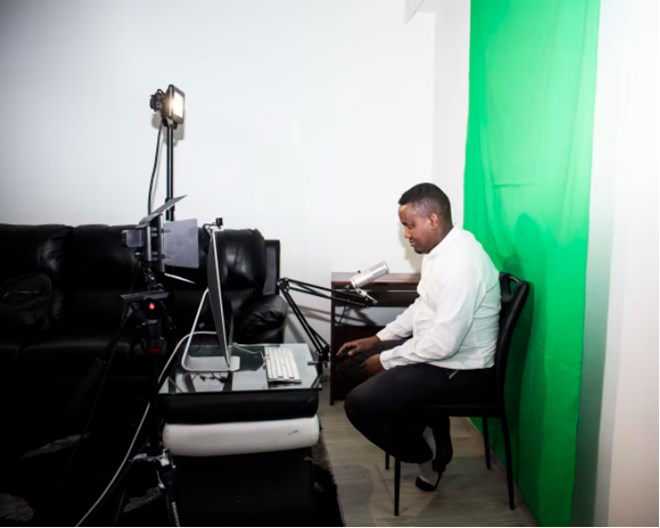Yle.fi
Thursday April 28, 2022

Sitting in front of a makeshift 'green screen' in the living
room of a Helsinki apartment, Hassan Kaafi Halane adjusts his microphone as he
prepares for the start of a Nato-themed webcast.
He has invited guests to join him online to discuss
Finland's possible application to join the military alliance, which in recent
weeks has come to the attention of — and raised concern among — many Somalis
living in Finland.
newsinisdeThe conversation will be conducted in the Somali language on
Facebook Live, and the viewership over the course of the webcast ranges from
hundreds to a few thousand.
"Somalis are scared that Russia will invade
Finland," Kaafi Halane tells Yle.
He had worked as a journalist in Somalia before fleeing to
Finland eight years ago. Somalia is one of the most dangerous places in the
world to be a reporter.
In Finland, Kaafi Halane supports himself and his family of
three children by working as a taxi driver. However, he has also wanted to
continue his work as a journalist to some extent, as he considers it important
to keep people updated about current affairs in the Somali language.
"The purpose of the programme is to increase the
awareness of Somalis living in Finland about Nato. People have been worried
about the consequences of joining Nato," he notes.

Kaafi Halane hosting the webcast from his living room in the Oulunkylä district of Helsinki. Image: Ronnie Holmberg / Yle
According to Statistics Finland, 23,656 people in the
country speak Somali as their mother tongue, making them the fifth largest
group(siirryt toiseen palveluun) of foreign language speakers in 2020.
Their command of the Finnish language varies greatly, especially
as many have only come to Finland in the past few years — while others were
born in Finland. This is why many do not follow news in Finnish or Swedish, but
rather their native language.
University of Helsinki researcher, Matti Pohjonen, has studied
the use of social media in East Africa, especially Ethiopia, and tells Yle that
— similarly with Somalis — the platforms are a very important means for
Ethiopians to keep up with news events as they live in different parts of the
world.
"People living in the diaspora typically follow several
news sources, which are available in their own mother tongue. They also follow
domestic news from their new country," Pohjonen says.
Some may also have poor literacy skills, which is why news
is often consumed visually, and another reason why social media plays a crucial
role within Finland's Somali community.
"Visual media sources play an important role in
countries with poor literacy. Information is sought from videos because they do
not require literacy," Pohjonen further notes.
Based on the background interviews conducted for this
article, people who have first hand experience of the war in Somalia are more
concerned about Finland potentially joining Nato than their counterparts born
in Finland.
Youths with Somalian backgrounds are eager to defend
Finland, especially those who have served in the country's army, Kaafi Halane
adds.
"If Russia attacks, young people say they will join the
army," he says.
Many Somalis
"fear" Finland's accession to Nato
Turku-based Alas Ali arrived in Finland in 1992 at the age
of 17, having traveled alone to Moscow to escape the civil war that ravaged his
home country. A few months after arriving in Finland, Ali learned that his
father, who had remained in Somalia, had been killed.
"Unfortunately, many Somalis have experienced war. Many
wonder if they will have to flee war again. Are we safe anywhere?" Ali
describes the feelings among the Somali community that have been evoked by the
war in Ukraine.
Ali is an entrepreneur and municipal politician representing
the Social Democratic Party, which is why he knows a lot of people. He says he
has listened to their thoughts about the ongoing war in Ukraine. Some people
have told him that they have difficulty sleeping because of those concerns.
Having previously served on Turku City Council for two
terms, Ali was elected to the Regional Council of Southwest Finland this year,
after garnering more than 500 votes.
He says that many Somalis who fled the war have experienced
a sense of security in Finland, enhanced by the Nordic nation's status of being
militarily non-aligned. Finnish negotiation skills and the will to defend peace
are highly valued among the Somali community, he adds.
"Many have a fear that if Finland joins Nato, what will
happen? Will the neighbour attack or not? When Finland talks about joining
Nato, people say that Finland can no longer be neutral. Finland is no longer a
mediator for peace," Ali says.
Researcher Pohjonen also notes the role played by the United
States within the Nato alliance in shaping Somali views, especially as American
soldiers who served as UN peacekeepers in Somalia in the 1990s were involved in
some of the fighting.
"There is strong criticism of the intentions of the
West and of the United States. Part of the Islamic movement has been against
Western imperialism and hegemony," Pohjonen says.
During the Cold War, the Soviet Union and the United States
struggled for decades to influence East African politics, and Pohjonen says the
after-effects of the Cold War are still being felt in Somalia.
In addition, many Somalis in Finland do not know enough
about Nato, and that uncertainty can increase fears. False information can
spread quickly and easily, Alas Ali says, because not everyone follows the news
in Finnish. For example, someone might see smoke caused by a fire and think
that Russia has launched an attack.
Researcher: Russia is
trying to influence people's opinions outside Europe
According to University of Helsinki researcher Pohjonen,
Russian attempts to influence public opinion in Western Europe have declined
significantly in recent months as social media companies have cracked down on
such content.
Furthermore, because of the war in Ukraine, anti-Russian
sentiment is currently so strong in Europe that it would be very difficult to
influence people's opinions. For this reason, Russian disinformation campaigns
have switched their attention to other parts of the world, like Africa, where
they hope to achieve better results.
"The farther we go from Europe, the more effective
Russia's disinformation can be. It would be logical to try to influence
countries that are not completely against Russia. However, it has not been
studied very extensively because of the strong interest in Europe,"
Pohjonen says.
University of Helsinki assistant professor, Katja Valaskivi,
tells Yle that false information — whether deliberately published or not —
spreads quickly on social media.
Lies tend to grab people's attention more effectively than
the truth, because false narratives tend to be surprising.
"People who are on the outside of society, or perceive
themselves to be on the outside, are more likely to believe conspiracy
theories. When you are not part of the community, it can be difficult to tell
what is true and what is disinformation," Valaskivi says.
Despite the concerns, many Somalis interviewed for this
article said they were in favour of Finland joining Nato, as they think it will
guarantee Finland's security in an unpredictable geopolitical situation.
Hassan Kaafi Halane, the host of the Facebook Live webcast,
sums up his thoughts on Finland joining Nato.
"Finland is a small country. Who will come to the
rescue if Russia attacks?"